Undergraduate Course Handbook - University of Oxford Department ...
Undergraduate Course Handbook - University of Oxford Department ...
Undergraduate Course Handbook - University of Oxford Department ...
- No tags were found...
Create successful ePaper yourself
Turn your PDF publications into a flip-book with our unique Google optimized e-Paper software.
Students are encouraged take their own notes or to amendhandouts as they find appropriate. Teaching material,including lecture notes or handouts must not be madeavailable on the web without permission. Publishingmaterial, including your version <strong>of</strong> the notes, withoutpermission, may be in breach <strong>of</strong> Copyright. Please notethat all lecture notes are only available from the <strong>Oxford</strong>domain for students and this is not available to any non-<strong>Oxford</strong> websites for Copyright reasons.Physics depends on experimental observations, and learninghow to perform and design experiments effectivelyis an essential part <strong>of</strong> physics education. Practical workis recorded in logbooks, and some practicals have to bewritten up. Termly progress reports on laboratory workare sent to College tutors. During the first three yearspractical work is compulsory; more details are given inthe year by year sections.The College-based tutorial teaching provides guidanceon what to study, and in what order, coupled withweek-by-week work assignments. These assignmentsare generally problems, with the occasional essay. Thisis a “Socratic” mode <strong>of</strong> instruction in which students’understanding is rigorously and individually probed andexpanded. College examinations (Collections) monitorstudents’ progress during the intervals between <strong>University</strong>examinations, and students are given regular reportson their progress.For the more specialised Major Options in Part C <strong>of</strong> theMPhys course, tutorials are replaced by classes organisedby the <strong>Department</strong>. Attendance at these classes iscompulsory, and records are kept <strong>of</strong> students’ progressand sent to College tutors.VacationsAt <strong>Oxford</strong>, the teaching terms are quite short – they addup to about 24 weeks in one year. Therefore it is essentialthat you set aside significant amounts <strong>of</strong> time each vacationfor academic work. The course assumes that you willdo this in preparation for College collections that are heldat the end <strong>of</strong> 0 th week. You should go over your notes,revising the material and supplementing it by informationgained from tutorials and from your own reading. Inaddition to consolidating the previous term’s work, theremay be preparatory reading for the next term’s courses.Your tutors may also set you some specific vacation work.Accessing the Physics Teaching web pagesWhen you are away from <strong>Oxford</strong>, you may need to accessmaterials on the web which are restricted. In the firstinstance, access to restricted resources from outside the<strong>Oxford</strong> network is provided via the <strong>Oxford</strong> <strong>University</strong>Computing Services (OUCS) Virtual Private Network(VPN) Service. A VPN connection provides your computerwith a “virtual” connection to the <strong>Oxford</strong> network- it then behaves exactly as it would if you were actually8on-campus. More information can be found at http://www.oucs.ox.ac.uk/network/vpn/.However some <strong>of</strong> the lecture materials and lecture listsmight also require the physics teaching login details.These are generally in the formPHYSICSTEACHING\The password is the same one you use for the PC Networkin the teaching labs. Please email support@teaching.physics.ox.ac.uk,explaining what you are trying todo, if you forget your password.ExaminationsThe First Year exams (Prelims) consist <strong>of</strong> four compulsorypapers, a Short Option paper and satisfactorycompletion <strong>of</strong> practical work. The compulsory papersare individually classified as Pass and Fail, with a Passmark <strong>of</strong> 40%. The examiners will take into account theperformance in the whole examination (the four CompulsoryPapers, the Short Option paper and PracticalWork) when considering the award <strong>of</strong> a Distinction andwhen considering borderline scripts. A failed compulsorypaper can be re-taken in September. The <strong>University</strong>requires that these papers must be passed at no morethan two sittings: see the Examination Regulations (‘TheGrey Book’) for full details. The current syllabuses forthe Prelims are given in Appendix C and a copy <strong>of</strong>the Examination Regulations in Appendix H. See AppendixB for information about the types <strong>of</strong> calculatorswhich may be used in the Public examinations.The FHS (Final Honour School in Physics), also calledFinals, is taken in parts over the final two (BA) or three(MPhys) years <strong>of</strong> your course (details in Year sectionsand the formal Regulations are given in Appendix I).The Examiners are a committee set up each year underthe Proctors. The Finals Examiners include externalexaminers from other UK Universities and may be assistedby a number <strong>of</strong> Assessors to set and mark someindividual papers, projects, etc. In general, papers arenot set and marked by the course lecturers; indeed theidentity <strong>of</strong> the examiner for any paper is confidential. Theidentity <strong>of</strong> the candidates is hidden from the examiners;no communication with the candidate (or the candidate’stutor) is allowed except via the candidate’s College’sSenior Tutor and the Junior Proctor. The questions arerequired to be set in conformity with the syllabus, whoseinterpretation is guided by previous papers except wherethere has been an explicit change <strong>of</strong> syllabus. The currentsyllabuses for the final examinations in physics areprinted in Appendices D - G.


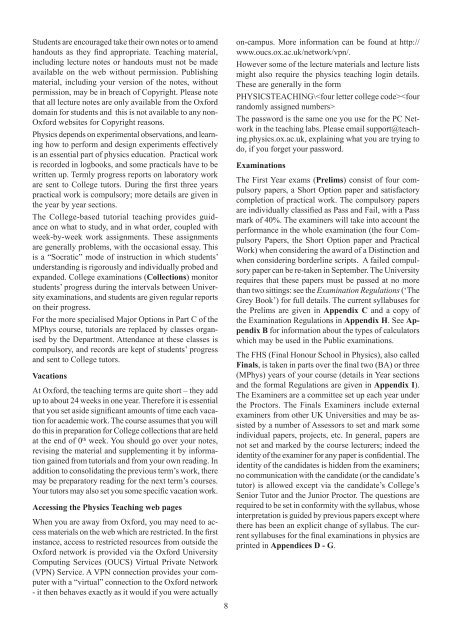
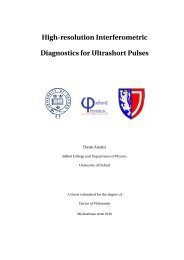
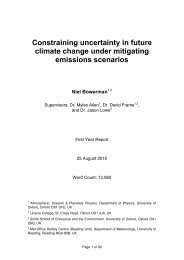
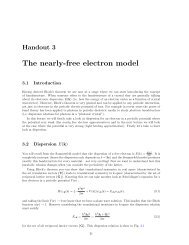
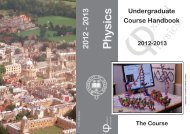
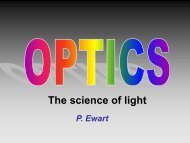
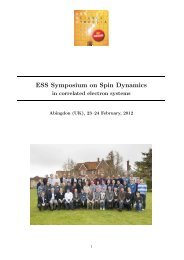
![Extended Notes 8 [pdf]](https://img.yumpu.com/50123548/1/190x245/extended-notes-8-pdf.jpg?quality=85)
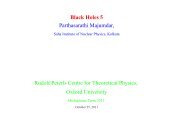
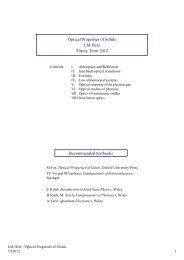
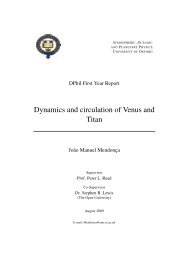
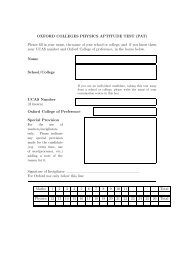
![Handout 3 [pdf] - University of Oxford Department of Physics](https://img.yumpu.com/46475432/1/190x245/handout-3-pdf-university-of-oxford-department-of-physics.jpg?quality=85)